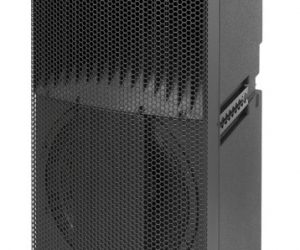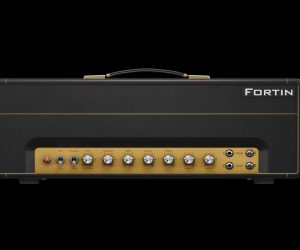
Building An Empire
Uli Behringer now owns Midas, Klark Teknik and Turbosound. AT went to The Music Group Factory to see the effects of this transition firsthand.
They only know how to build one way in China: Up. The entire economic zone of Guangdong is stacked layer upon layer to squeeze every last drop out of the landscape. Even rural townhouses are built vertically and left freestanding, waiting for a neighbouring upshoot to cover their exposed, featureless concrete sides.
It’s no different at Uli’s house, where Behringer’s foundations are making way for more elaborate designs as Uli builds on the reputations of Midas, Klark Teknik, and imminently Turbosound, to give Behringer’s facade a facelift.
Both the Midas and Klark Teknik badges have already surfaced on Behringer consoles, but the question on everybody’s lips is: Will that influence cut both ways?
Implied in that question is fear; fear for the demise of much-loved audio brands, suspicion of Behringer’s motives, and not being convinced about the quality of Chinese manufacturing.
FAST FOLLOWER
In some ways, Behringer does have a history of disrupting the futures of other brands. Its unashamed ‘fast follower’ business model has been to take a product that already has a strong market demand, then one-up them by producing it for a cheaper price and usually with more features. The constant mantra when talking to Behringer is, “Doubling the features at half the price means four times the value.” Which isn’t a bad mission statement, regardless of the brand.
Secondly, all of the competitors Behringer managed to one-up have since moved their production to China — it’s not where you produce, but how you manage it. There’s no magical set level of manufacturing quality in China, it can be great, fluctuating, or incredibly bad — especially when you sub-contract.

THE IMPORTANCE OF CONTROL
Uli knows all too well the perils of sub-contracting manufacture: “Subcontractors here in China don’t think long-term. For them, it’s a deal today, and not knowing if the customer will come back tomorrow. When I first came to Hong Kong, I met up with a sub contractor and asked him if he could make something. He said, ‘No problem.’ I asked again, if he could make something else. ‘No problem’, was his reply. It was fantastic, paradise, I thought they could make gold the way he was talking. They sent a prototype, and it was fantastic. At that time, I put $150,000, which was all had into it. The container arrived, and we opened the package and my heart dropped, it was junk. It was like a container full of bananas. We had 40 people working for us at the time, and we had every secretary, every cleaner, with a screwdriver in hand to rework a full container. That was my first experience, it almost killed the company.”
The experience left a mark, and he immediately relocated to Hong Kong to try and manage his way through sub-contracting, till finally, over ten years ago, he began manufacturing in China. “If you want quality,” he says. “You have to build it yourself, or have so much power, like Apple or Nike, that you can control the subcontractor.”
THE REAL DEAL
One of the worst quality culprits was flat ribbon cables. Cables in general are the single biggest point of failure, with failure rates excessively high for outsourced versions. These days The Music Group makes all its own cables. “It’s not very sexy,” Uli said. “And it’s not cheaper to do in-house either, but it’s necessary if you don’t want gear flowing back. We bought specific machines to align the connectors and the cables and apply a very defined amount of force.”
Fake semi-conductors was another problem. Sub contractors would wipe out the surface of a lower speed processor and restamp a higher speed on it. So when you ran the processor at the speed you thought it was intended for, it would burn out. “Now we buy components directly from the manufacturers,” said Uli, “which is the beauty of the volume game we have. We can buy stock from Cirrus Logic, Texas Instruments, Analog Devices.
“One bad product can wipe you out. We’re not nervous, but we’re very cautious.”
One bad product can wipe you out. We’re not nervous, but we’re very cautious

THE RIGHT WAY UP
So what effect has Behringer had on Midas and Klark Teknik? Well, let’s start the other way round.
When Uli wanted to move much of Midas’ manufacturing to China, the simple answer was, ‘No. You don’t have what we need there.’ So he asked them what they did need, which resulted in a $20m-long shopping list, including pick and place machines that rattle off collated components faster than a machine gun, but with accuracy in the points of a millimetre. There were plenty of other improvements too; X-ray machines that take the guess work out of solder joint quality, dedicated production rooms for Midas’ Pro fader, 14-layer circuit board production, machines dedicated to moving faders millions of times. And it’s not just investment in Midas, at each station you’ll find amber Behringer circuit boards right alongside the purple Midas boards as they go through the same processes. Uli dipped into his pockets for processes Midas gear won’t see; new ovens for baking speaker cones, as well as automating a lot more processes like applying glue — which is likely to have some correlation with Turbosound.
As it stands, the Pro series, Midas’ most successful range of consoles, is made solely in China, with the big boy, XL8, still made in Kidderminster, Worcestershire in the UK. And the shift is paying off. While Bosch was losing millions a year holding onto Midas, The Music Group has turned it completely around, by doing the one thing that keeps a console manufacturer afloat — selling loads of consoles. While Midas always had a rich heritage, and a mountain of R&D, the failure to stimulate the market place was a killer.
QUALITY EQUALS CONTROL
It’s hard to give a complete insight into the other side of the coin in a couple of brief visits to the Music Group factory, but it seems like quality is high up the checklist regardless. At the end of the line, consoles are left to power soak on eight hour cycles, there are water resistance-testing tanks, heat-testing ovens, RF chambers for EMC testing, component testing down to the last resistor, heat mapping, a room for safety testing, teams of Chinese workers dedicated to prodding the buttons, and working the faders of each console before they make their way into a box, and testing stations on every line.
It can’t all be attributed to Midas’ occupation, Uli’s been steadily growing The Music Group’s manufacturing as a core competency. The stairwells are lined with posters detailing updated manufacturing techniques, or line-specific changes. And Chinese labour isn’t as cheap as it used to be, with a 20% increase in wages year on year. These days, with so many manufacturing jobs available, workers are free to pick and choose, with incredibly high staff turnover rates often of 30%. The Music Group quotes its turnover rate as less than 3% a year, which only adds to its level of quality control.
PRICING CONVERSION
People will always ask how Behringer gets its prices so low, and will they begin to cheapen Midas too? Well, in a way, yes they will. “The quantity of components we’re buying is so massive, that we’re obviously buying at very different pricing,” said Uli. “For instance, we buy our AD converters from Cirrus Logic directly from the US, and we’re the second largest customer after Apple. In the Behringer X32 we have the CS5368 AD converter, which I believe is one of the best. That component is also used in Midas’ Pro 2 console. Before [the takeover] they were paying $18 for each chip, and we’re paying a fraction of that. We also have our own factory, so we don’t have to make a profit on the factory, which gives us a 25% cost advantage.
“And we hedge. When the oil price is low, we buy tonnes of granulate, which is what you use to make plastic injected speaker cabinets, and stock it in the warehouse. When you’re a public company, you can’t do that anymore.”
It’s not to say that all Midas and Behringer products are now the same. A simple example is the pot shafts on the consoles: on a Midas console they’re all metal, while on Behringer consoles, they’re plastic. Another difference is in the console fader systems. Both are made in-house, but Midas uses a specifically-developed Pro fader, of which they can only make a handful a day, but is guaranteed to last one million moves.

THE ONLINE ONSLAUGHT
Thomann recently stopped publishing its failure rate figures. Probably because it was too much for some brands to handle. But as the biggest retailer in Europe, it’s certainly got the sample size. In early 2012, the three-year average failure rate for Behringer was 0.74%, compared to some other manufacturers registering as high as 3%. And that was based on returns for product mostly built before the $20m capital injection. Likely, it would be lower now.
In the 20 years since Uli began manufacturing in China, over 11.5 million consoles have gone out through the gates. And a total of about 5 million pieces annually. If you’ve got tens of millions of product pieces out in the world, you have to get it right, or you’ll have millions of pieces coming back through the door. Confidence in a product is usually shown in a warranty, and the tooling up has given The Music Group confidence to give three years across all ranges, and all price points.
It’s part of a wider program that has seen a lot of investment in customer service. The message is that The Music Group has been growing faster than it can keep up with, and now it’s trying to fix the bad bits. With 25 people employed full time to trawl forums and answer people’s concerns online, you may have already had an interaction with the new-look Music Group.
One of the common themes is a lack of servicing when it’s required. It’s an issue that will become only more crucial as The Music Group moves from ‘fast follower’ to innovator. Walking through their R&D department, there are some bonafide game changers soon to hit the market. But the new innovations must work, and be easily serviced when they don’t. The Music Group has already set up new service centres in the UK and Nevada as part of this underlying pledge.
AUSTRALIAN SOIL
In Australia, Galactic Music has just gone from being the sole fulfilment partner to effectively representing Behringer in full in Australia as of December 21. It brings to an end the problematic arrangements Behringer has had in the past. Going from its own Australian distribution, to Galactic being the fulfilment partner while Behringer still had a small support and product specialist team, to a more traditional distribution arrangement, where the one distributor handles all aspects. A one-stop shop is a good thing, and Galactic has already made some changes in lieu of this announcement. Firstly, having built their reputation with the Kosmic stores in Western Australia, Galactic is now opening a Melbourne branch that will handle their products up the Eastern seaboard. Also, effective January, all Behringer products under $2000 will be replaced under warranty, and there will be service centres in every major city to handle everything else, or in cases where it would be faster to repair than replace.
It’s interesting times for The Music Group. It’s no longer just Behringer, it’s a family. If Midas is happy being in China. Shouldn’t we be? Someone once said of the Behringer factory, “It’s like a Swiss factory on China soil.” With the proposed $50m plant in the vicinity of mountains and water, Feng shui would say that Chinese soil might just be the best place to be.
















RESPONSES